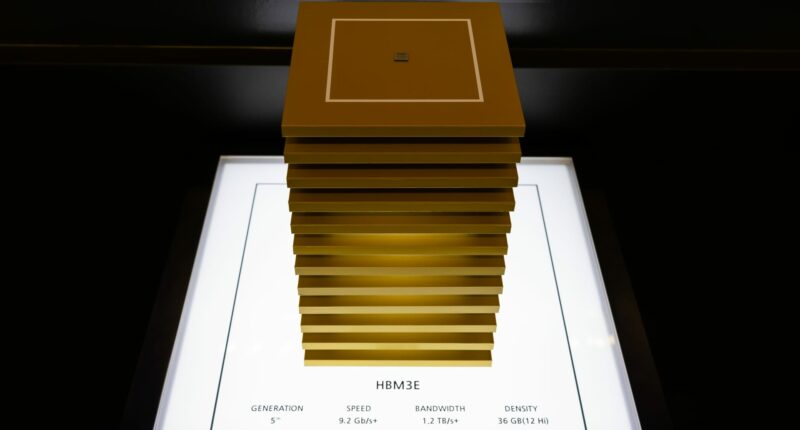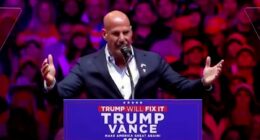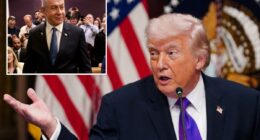Share this @internewscast.com
An impressive 12-layer HBM3E memory chip from SK Hynix Inc. was recently showcased at the Semiconductor Exhibition in Seoul, South Korea.
Photo courtesy: Bloomberg | Getty Images
The looming threat of a memory chip shortage is sounding alarms across the consumer electronics and automotive sectors, with experts suggesting this could become a significant issue next year. The surge in demand driven by the artificial intelligence sector is prompting companies to shift their focus accordingly.
During an earnings call, Zhao Haijun, co-CEO of Semiconductor Manufacturing International Corp (SMIC), China’s leading contract chipmaker, expressed concerns that anxieties over potential memory chip shortages are causing customers to hesitate in placing orders for other chip types.
“There’s a reluctance to commit to too many orders for the first quarter of next year,” Zhao explained. “The uncertainty around the availability of memory chips raises questions about how many phones, vehicles, or other products can be supported.”
Industry analysts highlight that these worries about supply constraints arise as chip manufacturers prioritize the production of advanced memory chips for artificial intelligence applications, diverting attention away from those needed for consumer goods.
“The AI build-out is absolutely eating up a lot of the available chip supply, and 2026 looks to be far bigger than this year in terms of overall demand,” Dan Nystedt, research analyst at TriOrient, told CNBC.
AI servers primarily run on processors from chip designers like Nvidia. These AI processors heavily rely on a type of memory known as High-Bandwidth Memory or HBM, which has proven extremely lucrative for memory companies like SK Hynix and Micron to pursue.
Memory suppliers have been chasing as much of this AI demand as possible thanks to typically high margins, Nystedt said, noting that AI server companies are willing to pay top dollar for premium chips.
“It could be very bad for PCs, laptops, consumer electronics and automotive, which depend on cheap memory chips,” he said.
Perhaps a bigger issue, however, is that the memory industry suffered some severe down turns in 2023 and part of 2024, leading to under-investment in the industry. “They’re building new capacity now, but it will take time to get running.”
Broader impacts
In the face of supply constraints, memory companies have reportedly been raising prices of their chips.
Just last Friday, Reuters reported that Samsung Electronics had quietly raised prices on select memory chips by as much as 60% since September. Samsung didn’t immediately respond to a request for comment.
“With memory prices rising and availability shrinking, concerns about production bottlenecks are gaining traction,” M.S. Hwang, research director at Counterpoint Research, told CNBC.
“Supply tightness is already hitting low-end smartphones and set-top boxes, but we think the risk could broaden,” he added.
China is “feeling the pinch more acutely” due to high reliance on low-cost devices, but Hwang cautioned that the supply constraints were a global problem.
In the meantime, consumers could pay the price of memory shortages.
In a report on Monday, tech-focused market intelligence and consulting firm TrendForce predicted that the memory industry has begun a “robust upward pricing cycle,” which could force downstream brands to hike retail prices, adding pressure on the consumer market.
As a result, the research group predicted increased price and demand pressures for consumer products like smartphones and notebooks.







